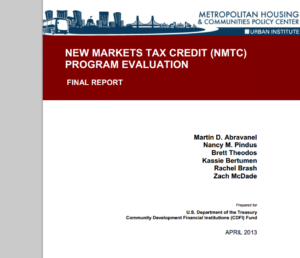“New Markets Tax Credit Program Evaluation” (Urban Institute): NMTC Coalition Response
On November 15, 2013, the Community Development Financial Institutions (CDFI) Fund released New Markets Tax Credit Evaluation, a formal evaluation of the first four years of the New Markets Tax Credit (NMTC) program (2003-2007). The Urban Institute’s study found that the NMTC has worked as envisioned, delivering capital to underserved communities and creating a variety of positive outcomes in those communities. As the study’s executive summary states:
In its early years, the NMTC program operated as intended—encouraging investments in low-income areas for a diverse range of community- and economic-development projects associated with varying results. The most prevalent results were provision of advantageous financing, real estate development in low-income areas, additions to local tax bases, and job creation or retention. NMTC projects also added to or expanded community amenities, services, and facilities and supported small businesses and organizations.
Key Findings:
The Urban Institute study found that the NMTC program delivered billions in private capital to low income communities, creating a diverse range of positive outcomes in targeted communities. These findings align with previous NMTC Coalition reports that documented the impact of NMTC investments in some of the nation’s most economically distressed communities.
Job creation:
The study found that NMTC investments created or retained 135,970 permanent jobs and 151,304 construction jobs between 2003 and 2007 . These jobs were not concentrated at any particular job level. Some projects created or retained primarily entry-level jobs, while others (such as a scientific research center) generated management-level or professional-level jobs.
- Read the full response: NMTCC Response to Urban Institute Report






